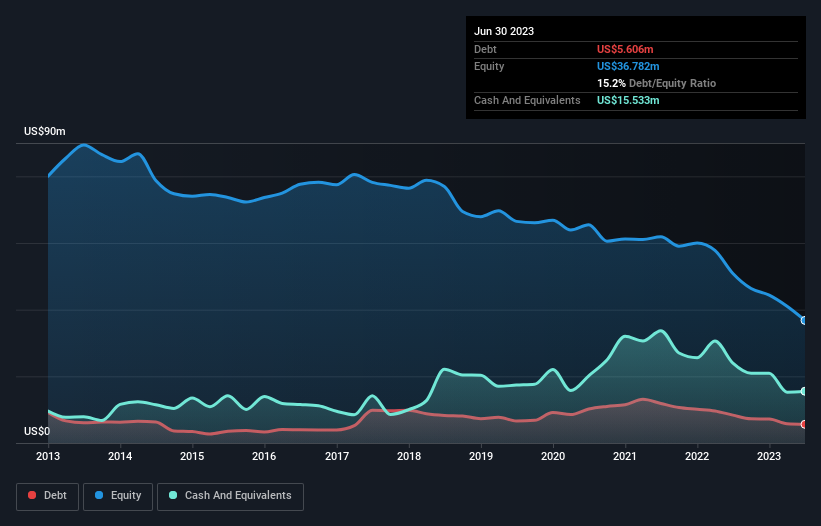- United States
- /
- Software
- /
- NasdaqCM:NTWK
NetSol Technologies (NASDAQ:NTWK) Has Debt But No Earnings; Should You Worry?
Some say volatility, rather than debt, is the best way to think about risk as an investor, but Warren Buffett famously said that 'Volatility is far from synonymous with risk.' So it might be obvious that you need to consider debt, when you think about how risky any given stock is, because too much debt can sink a company. We note that NetSol Technologies, Inc. (NASDAQ:NTWK) does have debt on its balance sheet. But the more important question is: how much risk is that debt creating?
When Is Debt Dangerous?
Debt and other liabilities become risky for a business when it cannot easily fulfill those obligations, either with free cash flow or by raising capital at an attractive price. In the worst case scenario, a company can go bankrupt if it cannot pay its creditors. While that is not too common, we often do see indebted companies permanently diluting shareholders because lenders force them to raise capital at a distressed price. Of course, the upside of debt is that it often represents cheap capital, especially when it replaces dilution in a company with the ability to reinvest at high rates of return. When we think about a company's use of debt, we first look at cash and debt together.
View our latest analysis for NetSol Technologies
What Is NetSol Technologies's Net Debt?
The image below, which you can click on for greater detail, shows that NetSol Technologies had debt of US$5.61m at the end of June 2023, a reduction from US$8.36m over a year. But it also has US$15.5m in cash to offset that, meaning it has US$9.93m net cash.

How Strong Is NetSol Technologies' Balance Sheet?
The latest balance sheet data shows that NetSol Technologies had liabilities of US$20.8m due within a year, and liabilities of US$828.4k falling due after that. Offsetting this, it had US$15.5m in cash and US$24.2m in receivables that were due within 12 months. So it actually has US$18.1m more liquid assets than total liabilities.
This surplus liquidity suggests that NetSol Technologies' balance sheet could take a hit just as well as Homer Simpson's head can take a punch. On this view, lenders should feel as safe as the beloved of a black-belt karate master. Simply put, the fact that NetSol Technologies has more cash than debt is arguably a good indication that it can manage its debt safely. There's no doubt that we learn most about debt from the balance sheet. But it is NetSol Technologies's earnings that will influence how the balance sheet holds up in the future. So when considering debt, it's definitely worth looking at the earnings trend. Click here for an interactive snapshot.
Over 12 months, NetSol Technologies made a loss at the EBIT level, and saw its revenue drop to US$52m, which is a fall of 8.5%. That's not what we would hope to see.
So How Risky Is NetSol Technologies?
Although NetSol Technologies had an earnings before interest and tax (EBIT) loss over the last twelve months, it generated positive free cash flow of US$370k. So although it is loss-making, it doesn't seem to have too much near-term balance sheet risk, keeping in mind the net cash. The next few years will be important as the business matures. The balance sheet is clearly the area to focus on when you are analysing debt. But ultimately, every company can contain risks that exist outside of the balance sheet. Case in point: We've spotted 3 warning signs for NetSol Technologies you should be aware of, and 1 of them can't be ignored.
When all is said and done, sometimes its easier to focus on companies that don't even need debt. Readers can access a list of growth stocks with zero net debt 100% free, right now.
Valuation is complex, but we're here to simplify it.
Discover if NetSol Technologies might be undervalued or overvalued with our detailed analysis, featuring fair value estimates, potential risks, dividends, insider trades, and its financial condition.
Access Free AnalysisHave feedback on this article? Concerned about the content? Get in touch with us directly. Alternatively, email editorial-team (at) simplywallst.com.
This article by Simply Wall St is general in nature. We provide commentary based on historical data and analyst forecasts only using an unbiased methodology and our articles are not intended to be financial advice. It does not constitute a recommendation to buy or sell any stock, and does not take account of your objectives, or your financial situation. We aim to bring you long-term focused analysis driven by fundamental data. Note that our analysis may not factor in the latest price-sensitive company announcements or qualitative material. Simply Wall St has no position in any stocks mentioned.
About NasdaqCM:NTWK
NetSol Technologies
Engages in the design, development, marketing, and export of enterprise software solutions to the automobile financing and leasing, banking, and financial services industries in North America, Europe, and Asia Pacific.
Adequate balance sheet with low risk.
Market Insights
Community Narratives



